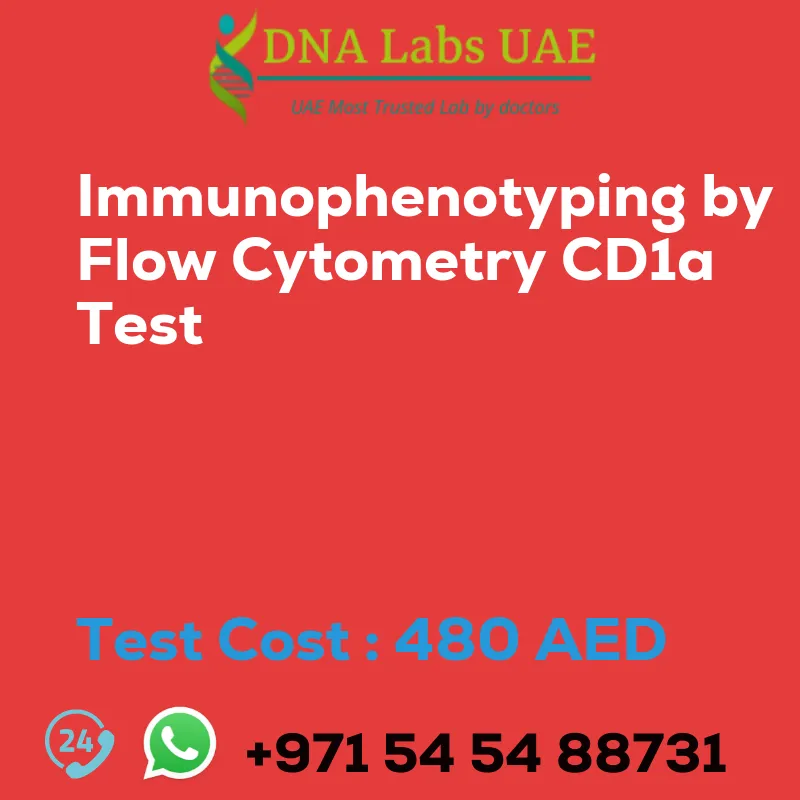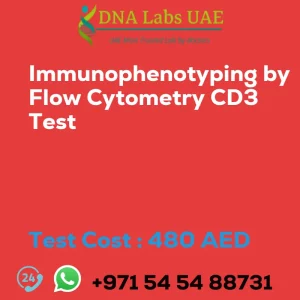IMMUNOPHENOTYPING BY FLOW CYTOMETRY CD1a Test
Test Name: IMMUNOPHENOTYPING BY FLOW CYTOMETRY CD1a Test
Components: CD1a Test
Price: 480.0 AED
Sample Condition: 3 mL (2 mL min.) whole blood in 1 Lavender Top (EDTA) tube and 3 mL (2 mL min.) whole blood in 1 Green Top (Sodium Heparin) tube OR 2 mL (1 mL min.) Bone marrow in 1 Green Top (Sodium heparin) tube. Ship immediately at 18-22°C. DO NOT REFRIGERATE OR FREEZE. Specify time, date, and clinical details on the test request form.
Report Delivery: Sample Daily by 9 am; Report Same day
Method: Flow Cytometry
Test Type: Cancer
Doctor: Oncologist, Hematologist
Test Department: FLOW CYTOMETRY
Pre Test Information: Give brief clinical history.
Test Details
CD1a is a marker that is commonly used in flow cytometry to identify and characterize certain immune cell populations. It is primarily expressed on dendritic cells, particularly in the skin, where it plays a crucial role in antigen presentation and immune response.
The CD1a test is performed using flow cytometry, a technique that allows for the analysis of individual cells in a heterogeneous cell population. In this test, cells are stained with fluorescently labeled antibodies specific for CD1a. These antibodies bind to CD1a molecules on the surface of cells, allowing for their identification and quantification.
By analyzing the fluorescence intensity of CD1a staining, flow cytometry can provide information about the abundance and characteristics of CD1a-positive cells in a sample. This information can be used to study the distribution and function of dendritic cells, as well as to diagnose and monitor certain diseases, such as Langerhans cell histiocytosis and certain types of leukemia.
In summary, the CD1a test is a flow cytometry-based assay that allows for the identification and characterization of CD1a-positive cells, particularly dendritic cells. It provides valuable information about immune cell populations and can be used in research and clinical settings to study immune responses and diagnose diseases.
| Test Name | IMMUNOPHENOTYPING BY FLOW CYTOMETRY CD1a Test |
|---|---|
| Components | |
| Price | 480.0 AED |
| Sample Condition | 3 mL (2 mL min.) whole blood in 1 Lavender Top (EDTA) tubeAND 3 mL (2 mL min.) whole blood in 1 Green Top (Sodium Heparin) tube OR 2 mL (1 mL min.) Bone marrow in 1 Green Top (Sodium heparin) tube. Ship immediately at 18\u0192??22?\u00f8C. DO NOT REFRIGERATE OR FREEZE. Specify time, date and clinical details on test request form. |
| Report Delivery | Sample Daily by 9 am; Report Same day |
| Method | Flow Cytometry |
| Test type | Cancer |
| Doctor | Oncologist, Hematologist |
| Test Department: | FLOW CYTOMETRY |
| Pre Test Information | Give brief clinical history. |
| Test Details |
CD1a is a marker that is commonly used in flow cytometry to identify and characterize certain immune cell populations. It is primarily expressed on dendritic cells, particularly in the skin, where it plays a crucial role in antigen presentation and immune response. The CD1a test is performed using flow cytometry, a technique that allows for the analysis of individual cells in a heterogeneous cell population. In this test, cells are stained with fluorescently labeled antibodies specific for CD1a. These antibodies bind to CD1a molecules on the surface of cells, allowing for their identification and quantification. By analyzing the fluorescence intensity of CD1a staining, flow cytometry can provide information about the abundance and characteristics of CD1a-positive cells in a sample. This information can be used to study the distribution and function of dendritic cells, as well as to diagnose and monitor certain diseases, such as Langerhans cell histiocytosis and certain types of leukemia. In summary, the CD1a test is a flow cytometry-based assay that allows for the identification and characterization of CD1a-positive cells, particularly dendritic cells. It provides valuable information about immune cell populations and can be used in research and clinical settings to study immune responses and diagnose diseases. |








